In the past I have had opportunities to spend money at Carrefour, but due to a conflux of circumstances, I am happy to say that I have never bought a thing from this large French supermarket chain. And now I never will.
Via Tim Blair.

|
|||||
|
In the past I have had opportunities to spend money at Carrefour, but due to a conflux of circumstances, I am happy to say that I have never bought a thing from this large French supermarket chain. And now I never will. Via Tim Blair.  Erik and Arthur Wneir from No Pasaran took on several thousand Muslim protesters and only the intervention of French police prevented a repeat of the Battle of Tours. More seriously, watch the video to see the characteristic Muslim reaction to people daring to state an opinion different to theirs. “As an old Sci-Fi fan, I firmly believe that we will encounter alien races someday. These conversations are good practice. I would imagine there will really be some different worldviews when that happens, esp. if they’re hydrogen breathers.” Comment by regular Samizdata contributor calling himself VeryRetired, who describes what it feels like to debate with apologists for radical Islam: ie, the sheer inability to bridge a gulf of understanding between those who support the open society, free speech and enquiry, and those for whom the statements contained in a book written over a thousand years ago contain the sum total of wisdom, the criticism of which should be dealt with violently. I certainly do tend to think that understanding of how to cope with radical Islam can be usefully supplemented by reading Robert A. Heinlein, say, or Vernor Vinge rather than the editorial pages of the Guardian or the Daily Telegraph. The demonstration in Trafalgar square, supported by dhimmi-in-chief for London Ken Livingston, was clearly orchestrated to show a homogenised face of ‘moderate Islam’ for the world to see. An interesting feature of the demo was that no ‘home made placards’ were tolerated by the organisers. A small group of Kurds turned up with their own signs and were fairly quickly handed the printed blue-white official signs. I was not quick enough to get a picture of the Kurdish ones before they vanished as I did not expect them to be taken down, but the ones in English were fairly anodyne. 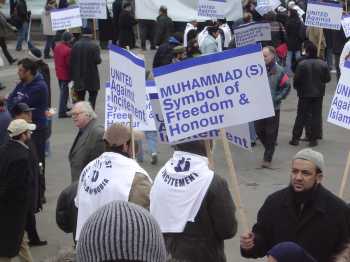
Not even in Islamic green! I would guess maybe 7,000 people showed up, perhaps 10,000 tops, at least by the time I lost interest around 3:00 and wandered off to a nearby computer faire. Many of the usual suspects were there, such as the inevitable socialist workers and CND set… 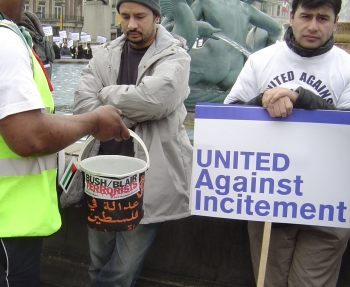
Quite what wicked old Blair and BushMcHitler have to do with protesting against cartoons of Mohammed in Denmark was not clear
Hands off secular fascist police states and theocratic police states!
You can be sure those naughty cartoons (or that tee-shirt) would not have been allowed in Cuba! The large official signs were clearly expensive high quality creations and contained all manner of utterly irrelevant slogans designed to appeal to the ‘hard of thinking’. 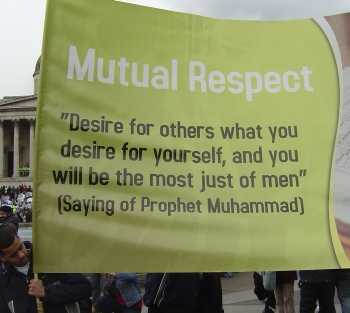
So if some Muslim desires sharia law for themselves, presumably this is what he also wishes for me… Oh I feel much better now!
Tolerance? Sure, it is yours by right. Respect? You must be joking, that you have to earn Jyllands-Posten did not ‘incite’ to violence, they just defended free expression, unlike some others we know of. Respect however has nothing to do with it And just to remind people what this is really about… 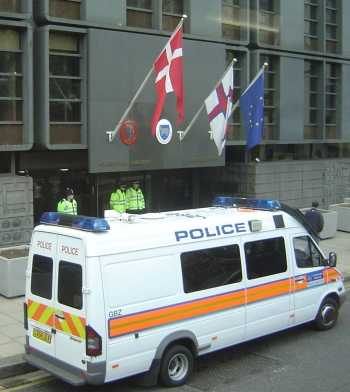
The Danish embassy in London under police guard And one final picture which tickled my sense of irony… a pleasant looking young woman watching the demonstration in her stylish Christian Dior scarf. 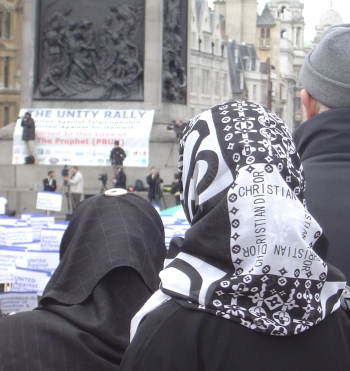 A Danish blogger and columnist, Henrik Føhns, alerted me to a post on his blog, Mondofunza about a letter to ‘Muslim citizens’…
Despite some agonising, Henrik’s response is unequivocal:
Note: Also, Happy Birthday, Henrik! Muslim Action Committee are calling for changes to the law in Britain to implement an aspect of sharia law and they want the British state to do it for them. What they want is to legally ban people from displaying pictures of Mohammed, the seventh century warlord who founded their religion, because it annoys them. Never mind that showing images of this historical figure does not threaten them with violence or prevent their exercise of religion, they want to make it illegal to annoy them. They are planning to stage a protest march in London on 18 February, expecting to attract 20,000 to 50,000 people. I hope the number is considerably larger because I am sure as hell going to be there expressing my views as well. If they get their way, we will undoubtedly be prosecuted as Samizdata’s response to this islamo-fascist proposal will be a “Mohammed Picture of the Day”, each day and every day until hell freezes over or we run out of server space. Intolerant Islam does not like being annoyed? Well guys, you ain’t seen nothing yet, I promise you that. Our Dutch friends at The Amazing Retecool are a fairly good place to start for interesting interpretations of Mohammed’s image. If this ever becomes law and I personally get dragged into court over what Samizdata will most certainly do, rest assured that as we are hosted in the USA we will remain on-line and ‘expressive’ regardless, even if I have to ‘host’ myself in the USA a few years earlier that I expected. So to all your intolerant Islamic fascists out there who think it is within your power to silence all the voices you dislike, with all due respect (i.e. none), you are very much mistaken. As the years pass, I am finding the term ‘terrorist’ grating more and more on my sensibilities. While this word might still be useful in some contexts, it has been so abused, mis-applied, mis and over-used that we should mostly just drop it. As a starter, we are not fighting a war on terrorism. I repeat. We are not fighting a war on terrorism. Yes, that is what I said. There is not and cannot be a ‘war’ on terrorism. Terrorism is a tactic. You do not fight wars on tactics; you use tactics in wars. You fight wars against enemies. We are not fighting ‘terrorists’ in Iraq and around the world. We are fighting and killing enemies of our nations and our way of life. ‘Enemy’ is a good, descriptive and lately underutilized word. It says just what we should mean. An enemy is the guy on the other side who wants to kill you. He is the guy you want to kill first. His use of certain tactics might make you wish his demise all the more, but that is not why you are fighting him. You are fighting him to prevent him from achieving his victory conditions. When you confound tactics with goals and opponents, you leave yourself wide open to rhetorical traps. Is it a terrorist act if our enemy blows up an Abrams tank with an IED? Was it a terrorist act when we blew up German Tiger tanks in WWII? Of course not. A mine is a weapon. Blowing up material and killing members of the opposition is how you wage war. IED’s are part of a tactic which almost any of us would use if we were in a conflict and in a similar position. Does that statement bother you? If it does, I would ask, “Why?” The enemy in Iraq uses IED’s. We are not trying to kill them because they use IED’s. An IED is a home-made land-mine. We are out to kill them because they are the enemy and because we are right and they are wrong. The enemy firmly believes they are right: if they did not they would not be dying for their cause. Because of their belief they will apply whatever tools and ideas and strengths they have to killing us. We have the luxury of overwhelming force that allows us the rare in historical annals additional luxury of decrying the use of some tactics. If the idea of making a value judgement in favour of your own beliefs worries you, it is your problem, not mine. So let us just get on with crushing the enemy. … in October of last year and nothing happened. So obviously it took a while for the people who wanted to blow this up some time to get all those highly inflammable Danish flags made and organise the outrage. Maybe we are looking in all the wrong places for the people behind this. Radical Islamic clerics? Nah, it was all a conspiracy by Middle Eastern flag makers.
Excellent! Who needs sanctions when these guys will impose them on themselves. Wow, with enemies like that, who needs friends? Here is a photo taken of the march by Muslims protesting against Jyllands-Poster and the ‘Satanic Cartoons’ saga in London earlier today. The placards read Behead those who insult Islam & Butcher those who mock Islam & Slay those who disrespect Islam etc. etc. Freedom of expression is quite literally intolerable to them. And we cannot and must not tolerate that. It makes no logical sense to tolerate intolerance. With thanks to H for the picture And for those of you who say “It’s just a protest”… The bizarre desire of Islamists to prolong the Jyllands-Posten ‘Satanic Cartoon’ saga has now escalated the whole issue and caused French newspaper France Soir to join the fight for freedom of expression and also republish the offending cartoons. To quote what a commenter called Max wrote in an earlier article here on Samizdata whilst arguing with an outraged Muslim commenter:
Aux armes, mes amis! The Big Pharoah has some rather rational things to say about the ‘Satanic Cartoons’.
Indeed. |
|||||

All content on this website (including text, photographs, audio files, and any other original works), unless otherwise noted, is licensed under a Creative Commons License. |
|||||